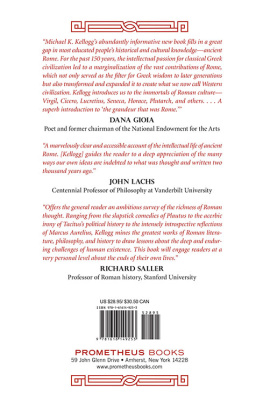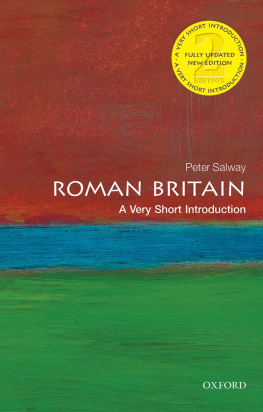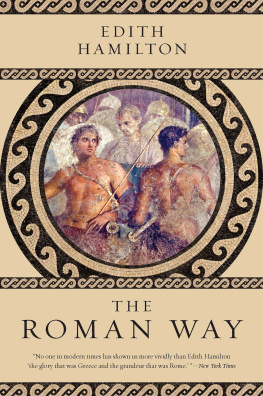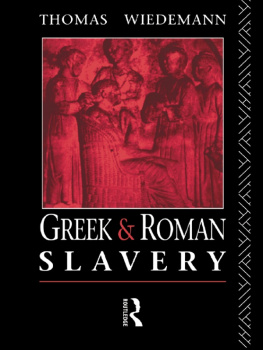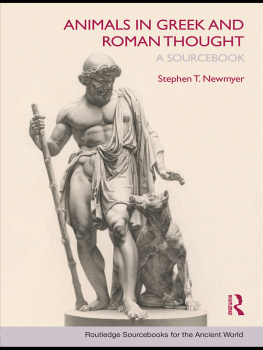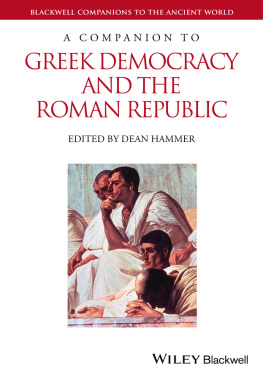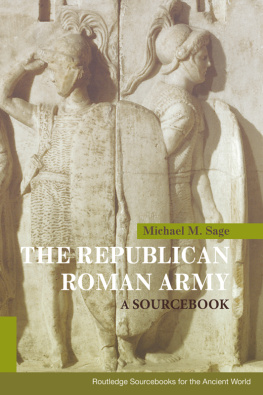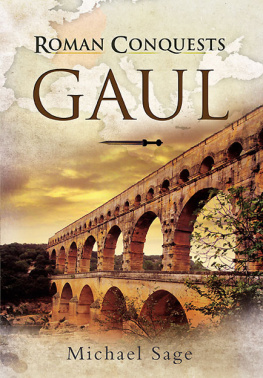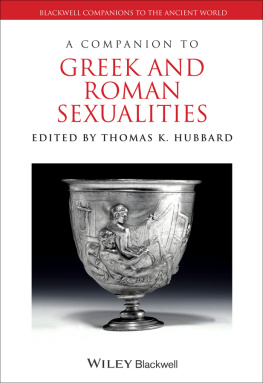
I have not tried to document every source for the ideas in this book. But my extensive debt to generations of classical scholars and translators will be obvious to those in the field. I have tried to list the books and articles on which I most relied, as well as those from which general readers would most benefit, in the section on Suggestions for Further Reading. I also cite there in full the excellent translations of Robert Fagles, David Ferry, Dana Gioia, Michael Grant, Peter Green, Robin Hard, R. E. Latham, Charles Martin, Betty Radice, Niall Rudd, David Slavitt, Maxwell Staniforth, E. F. Watling, David West, and others, from which the quotations in the text are derived.
I was helped by many readers of individual chapters in draft form, among them, Harry Kellogg, Peter Kellogg, Marissa Miller, and Aaron Panner. Dana Gioia, John Lachs, and Richard Saller read the finished manuscript and provided generous comments in support. Dean Saller also made a number of helpful suggestions and corrections.
Darrin Leverette scrupulously polished the entire manuscript, checking the cites, the facts, and the prose. His intelligence, attention to detail, willingness to track down obscure sources, and sensitivity to the nuances of language were all indispensable. So, too, was the work of Bernadette Murphy and my longtime assistant, Marilyn Williams, in proofing the manuscript and putting it in final form.
I was fortunate once again to have Jade Zora Scibilia as my editor at Prometheus Books. She improved the writing, sharpened the ideas, and saved me from many errors. She was also a delight to work with.
As always, my greatest thanks go to my wife, Lucy, and to my three childrenBaird, Cole, and Camillewho supported and encouraged me throughout the writing of this book.

Author photo by Leslie Cashen
Michael K. Kellogg is the author of The Greek Search for Wisdom and Three Questions We Never Stop Asking. Educated at Stanford and Oxford in philosophy and at Harvard Law School, he is a founding and managing partner at Kellogg, Huber, Hansen, Todd, Evans & Figel, PLLC.

The first known literary work in Latin was a translation of the Odyssey by the Greek-born tragedian Livius Andronicus (ca. 284ca. 204). At the time, translation was itself a new art form. Before Andronicus, Latin readers either learned Greek or went without; after Andronicus, Roman schoolboys could read Homer in their native language. Thus began a tradition of the translation, adaptation, and gradual transformation of Greek originals into the foundations of a distinctly Roman literature. Rome absorbed Greek culture as aggressively and systematically as it conquered the Mediterranean world.
For us, Roman literature begins with Titus Maccius Plautus (ca. 254184). The tragedies of Andronicus and Quintus Ennius (239169), based on Greek models, were more highly regarded and praised in antiquity than Plautus's comedies. So, too, was Ennius's epic poem of Rome's founding, the Annales. Yet Plautus is the first Roman author whose writings have survived. We possess twenty complete or nearly complete comedies by Plautus and six by his successor, Publius Terentius Afer (ca. 195159), known to us as Terence.
It is ironic, and yet somehow fitting, that Roman literature begins with comedy. When we think of Rome, we think of brutal conquests abroad and ruthless power struggles at home. During the era of Plautus and Terence, Rome was fighting for its very existence in the Punic Wars that ultimately resulted in the complete destruction of Carthage, Rome's rival for hegemony in the Mediterranean. The Roman Republic was dominated by aristocratic senators, most particularly Marcus Porcius Cato (ca. 234149), known as Cato the Censor, who enforced the principal Roman virtuesvalor (virtus), dutifulness (pietas), industry (industria), and frugality (frugalitas)within a strict and repressive social hierarchy that was heavily dependent upon slave labor and that treated women and children as just another form of property.
The military and political spheres are wholly absent from the plays of Plautus and Terence. They wrote domestic comedies modeled on the new comedies of Menander and his Hellenistic contemporaries. Plautus and Terence, too, set their plays in Greece, mostly at Athens. Romans viewed the Greeks then rather as the Germans view contemporary Greeks todayas querulous, duplicitous, pleasure-loving, profligate, and lazyand Plautus in particular capitalizes on those stereotypes. And yet his characters regularly remind the audience that the Athenian setting is just a pretense. What we are seeing is a portrait of contemporary Romans at home; not the official, stern portrait of the Roman military republic, but a funhouse mirror in which everyday life is distorted and turned topsy-turvy.
Plautus caricatured and subverted the standard roles in Roman society (fathers and mothers, sons and lovers, soldiers and slaves). He presented these types in their most ridiculous aspect, and through the catharsis of laughter, the rigors of Roman life became more palatable. Plautus humanized the Romans and in doing so brings us closer to them. Just beneath their serious and pompous exteriors lie the endless possibilities of farce. Indeed, it is precisely the serious, pompous exteriors that so readily lend themselves to farce. Without Plautus, ancient Rome would be intolerable. His comedies make clear that the order, hierarchy, and strict obedience touted by Rome could not have been so absolute. After Plautus, it is impossible to take the Romans as seriously as we might otherwise have done. In the process, we find that we cannot take ourselves quite as seriously either.
Plato argued in the Laws that it will be impossible to understand the serious side of things in isolation from their ridiculous aspect. Plautus helps us to understand the full complexity of Roman life and how ridiculous each of us becomes when we attempt to squeeze ourselves into an established mold. Like the Romans, we play various parts in the world, but we have little self-knowledge. We publicly tout the virtues of courage, piety, industry, and frugality, but our behavior reveals a wide gap between what we say and what we do. We propose to control ourselves and our fate. But in his comedies of mistaken identityof children lost at birth and identical twins: real, imagined, and divinePlautus shows that error, deception, and chance are the gods that truly rule our existence. Plautus used farce to illuminate the underlying human condition. He found wisdom in laughter.
THE GOLDEN AGE OF ROMAN DRAMA
The first dramatic performance in Rome took place in 240, one year after the end of the First Punic War (264241). It was a tragedy written by Livius Andronicus, based on a Greek model. Andronicus was considered the father of Roman literature by Cicero, Horace, and others, and the period from 240 to the death of Terence in 159 was by common consent the golden age of Roman drama. Yet only the merest fragments of Andronicus's many plays survive. Equally unavailable to us are the plays of Gnaeus Naevius (ca. 270ca. 201), who tested the bounds of censorship with a comedy that mocked one of the aristocratic families in Rome. Rome was not Greece, and Naevius did not enjoy the immunity of Aristophanes. Personal criticism of the powerful was forbidden, and he was thrown into prison. Naevius wrote two more plays in prison and was then released after apologizing for his indiscretion, but a second episode led to his banishment and eventual suicide. Quintus Ennius had a more successful and discreet career, but no greater luck with the survival of his plays. Even his great epic poem on the founding of Rome, which was mandatory reading for all Roman schoolboys, survives only in fragmentary lines.

